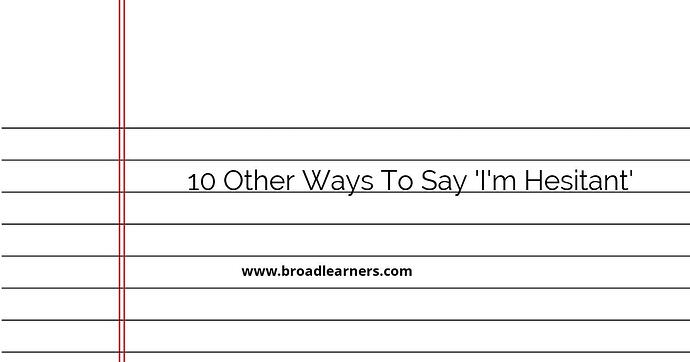When expressing hesitation, it's important to choose the right words to convey your thoughts and feelings. Saying 'I'm hesitant' is a straightforward way to express your uncertainty, but there are alternative phrases that can add variety and nuance to your language.
Here are 10 other ways to say 'I'm hesitant':
- I have reservations
- I'm unsure
- I'm skeptical
- I'm apprehensive
- I have doubts
- I'm wavering
- I'm having second thoughts
- I'm on the fence
- I'm indecisive
- I'm faltering
Let's explore each of these alternatives in more detail:
1. I have reservations
Saying 'I have reservations' implies that you have some concerns or doubts about a particular situation or decision. It suggests that you need more information or reassurance before making a commitment.
Example:
I have reservations about accepting the job offer because I'm not sure if it aligns with my long-term career goals.
2. I'm unsure
'I'm unsure' indicates a lack of certainty or confidence in your judgment. It implies that you need more time or information to make a decision.
Example:
I'm unsure about attending the event because I'm not familiar with the topic and I'm not sure if it will be relevant to my interests.
3. I'm skeptical
When you say 'I'm skeptical,' you're expressing doubt or disbelief. It suggests that you have reservations based on past experiences or a lack of trust in the information presented.
Example:
I'm skeptical about the new product's claims because I've tried similar products in the past that didn't deliver the promised results.
4. I'm apprehensive
Saying 'I'm apprehensive' means that you feel uneasy or anxious about a situation. It suggests a sense of caution or wariness.
Example:
I'm apprehensive about traveling alone to a foreign country because I've never been there before and I don't speak the language.
5. I have doubts
'I have doubts' indicates that you have uncertainties or reservations about something. It implies a lack of confidence or trust.
Example:
I have doubts about the effectiveness of the proposed solution because it hasn't been tested in real-world scenarios.
6. I'm wavering
When you say 'I'm wavering,' you're expressing indecisiveness or fluctuating opinions. It suggests that you're uncertain and considering different options.
Example:
I'm wavering between two career paths because both have their advantages and disadvantages, and I'm finding it difficult to make a final decision.
7. I'm having second thoughts
Saying 'I'm having second thoughts' means that you're reconsidering a previous decision or opinion. It suggests that you're experiencing doubts or changing your mind.
Example:
I'm having second thoughts about buying the car because I just found out that it requires expensive repairs.
8. I'm on the fence
'I'm on the fence' indicates that you're undecided or neutral about a situation. It suggests that you haven't committed to a particular choice.
Example:
I'm on the fence about attending the party because I'm not sure if I'll enjoy it or if I have other commitments that day.
9. I'm indecisive
Saying 'I'm indecisive' means that you have difficulty making decisions. It implies a lack of confidence or a tendency to waver between options.
Example:
I'm indecisive about which restaurant to choose for dinner because both options have good reviews and menu choices.
10. I'm faltering
'I'm faltering' suggests that you're hesitating or losing confidence in your actions or decisions. It implies a sense of uncertainty or weakness.
Example:
I'm faltering in my commitment to the project because I'm overwhelmed by the workload and uncertain about its potential success.
These alternatives to 'I'm hesitant' can help you express your uncertainty more effectively and add variety to your language. Choose the phrase that best reflects your thoughts and feelings in a given situation.
Did I miss anything? Respond below
